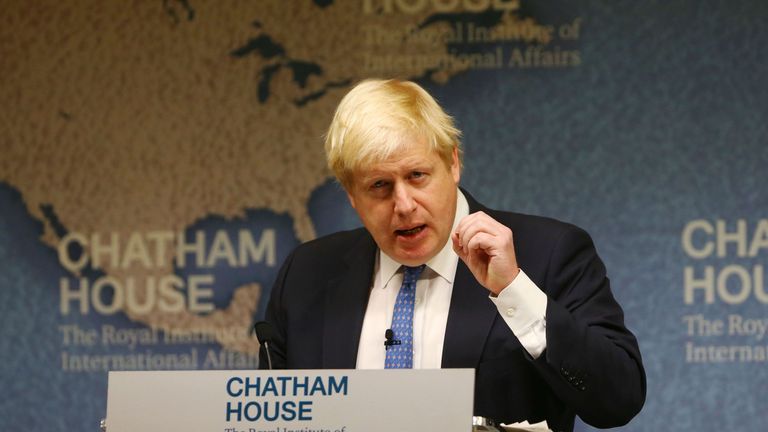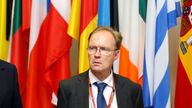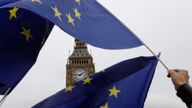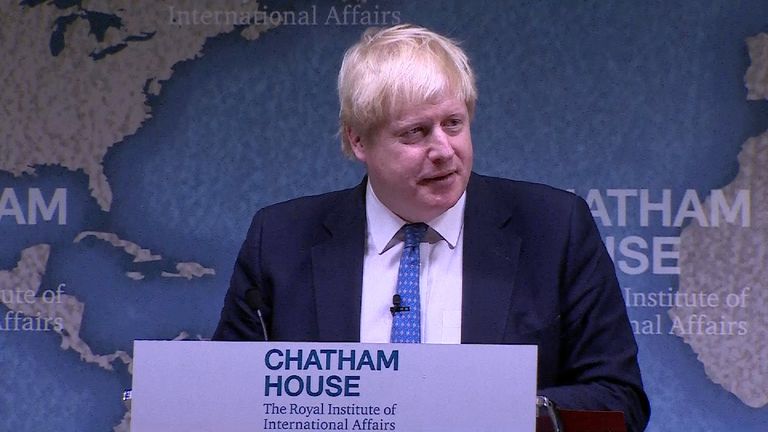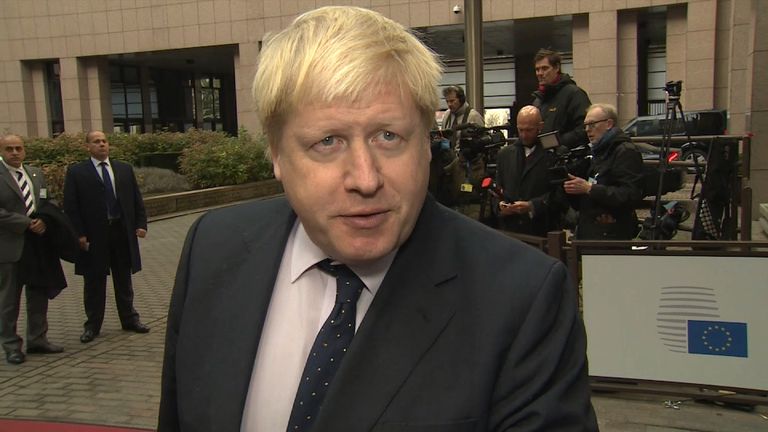Johnson: UK will not block more EU integration on defence
In his first major speech as Foreign Secretary, Mr Johnson says it is in the UK's interests to have close ties with a "strong EU".
Friday 2 December 2016 14:10, UK
Britain will not try to stop closer European defence co-operation following its exit from the EU, Boris Johnson has said.
The Foreign Secretary said the UK's interest was to have close ties with a "strong EU" and the Government would not "block or impede" moves towards integration, including a common security and defence policy.
Referring to the EU's ambitions to build its own defence "architecture" alongside NATO, he said: "If they want to do that, fine", although he added the priority should be meeting NATO's target of spending 2% of GDP on defence.
The comments appeared to contradict Defence Secretary Michael Fallon, who has insisted the UK will "continue to oppose any idea of an EU army or EU army headquarters, which would simply undermine NATO".
Responding to Mr Johnson's comments, a Downing Street spokesman said: "We are very clear that Nato is the bedrock of our and Europe's defence.
"What we have been clear about is that any EU defence and security proposals that may come forward should complement Nato and not duplicate Nato."
Speaking at Chatham House, the spiritual home of international affairs in London, Mr Johnson said the UK must be "more outward-looking and more engaged with the world than ever before" in the aftermath of Brexit.
He added: "Brexit emphatically does not mean a Britain that turns in on herself.
"Yes, a country taking back control of its democratic institutions but not a nation hauling up the drawbridge or slamming the door, a nation that is now on its mettle."
The speech comes after but that the Government was against it.
And after his address he said the "ludicrous" story had been "convincingly refuted".
The Government's travails continued after Brexit Minister David Davis and the Chancellor of the Exchequer in an effort to secure the best deal on separation.
Norway, for example, pays an annual sub to Brussels to trade freely as part of the European Economic Area. And it allows for the free movement of labour for EU citizens.
Part copies of Mr Johnson's speech revealed no clues on where he stood on paying a subscription to remain part of a European market.
Mr Johnson also risks setting himself on a collision course with Theresa May, who has said that the UK should withdraw from the European Convention on Human Rights.
The convention, signed in 1950 by the 47 members of the Council of Europe, established the European Court of Human Rights after the Second World War.
It has been seen as a largely British concept designed to prevent the rise of totalitarianism in Europe that has been a pillar of international law.
Mr Johnson's speech stressed Britain's commitment to international law to ensure a "rules-based system and order prevails".
He said: "We are struggling against non-state actors who view the whole concept of a global liberal order with contempt and it is precisely because of the intensity of these challenges that we need to redouble our resolve and to defend and preserve the best of the rules-based international order."
"We have to acknowledge that in many respects the world is not in good shape," Mr Johnson added.
"We have the cult of the strong man, we have democracy in retreat, we have an arc of instability across the Middle East from Iraq to Syria to Libya.
"What is the answer of the UK? Is it to cower and put the pillow over our heads? Emphatically not."
To drive the point home, he agreed with Donald Trump that NATO members should pay the full 2% of GDP on defence and 20% of that on equipment.
Mr Johnson also insisted it made little sense to have the US absorb 70% of the financial burden for NATO while 27 other nations stump the remaining 30%.
He reiterated his view that normalisation of relations with Russia is impossible while Moscow continues to destabilise Ukraine and bomb Aleppo.
"Britain is prepared to be tough with Russia," he insisted.
